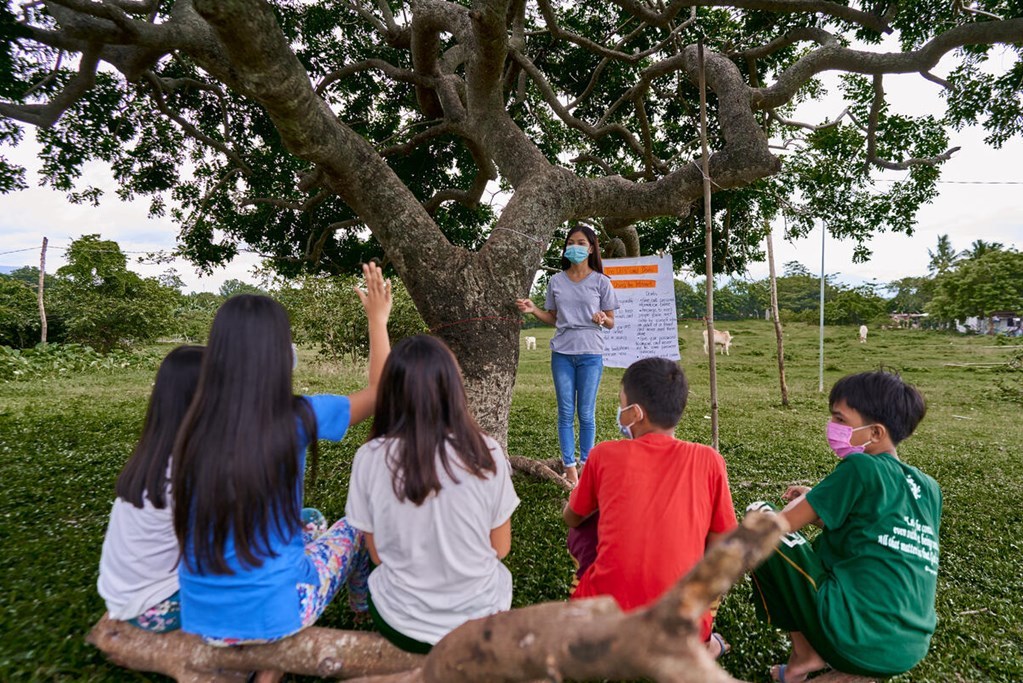
Michaela protects other children from online sexual exploitation
Michaela protects other children from online sexual exploitation
The ripple effect of sponsorship: a legacy of impact in the Philippines
What if you could stop a child from becoming the victim of sexual exploitation?
What if you could be the reason a teenage girl learned how to keep herself safe?
What if she then became a catalyst for change in her community, teaching other kids how to protect themselves from falling prey to online abuse?
Michaela is 16 years old, and like lots of kids her age, she has grown up with the internet. She lives in the Philippines, where almost 80 million people are internet users and, on average, people spend more time online each day than anywhere else in the Asia-Pacific region. The Philippines Digital Strategy, released in 2010, declares access to the internet a human right, and the government has launched a string of initiatives to help make sure that everyone, even kids living in poverty, can get online and access the education and work opportunities that the internet opens up. Access to the internet has been more important than ever since COVID-19 hit. Schools across the country closed at the start of the pandemic, and 18 months later, only 5,000 of the Philippines’ 27 million public school students had been allowed to return to classrooms. Online learning has become the norm for Michaela’s generation. But while that has opened up new opportunities, it has also created some very real dangers.
Michaela says that most of the times, children do not know the extent of the danger that the internet may bring: young people simply don’t understand that while the internet can be a powerful tool, there are also risks that they need to be aware of. Children may be protected from being exploited if they are aware of what should and should not be done online. Michaela says children must be able to develop self-confidence, so they feel able to say “no”, or analyse their situation.
According to the Philippines Department of Justice, cases of online sexual abuse and exploitation increased by 264 percent in the first three months of COVID quarantines compared with the year before, with more than 279,000 cases of children reported. The real number of children exposed is likely much higher and we’re now well past those first few months. A 2020 study conducted by the International Justice Mission (IJM), which combats violence against children in the Philippines, showed that the prevalence rate of internet-based child sexual exploitation in the Philippines has more than tripled in a span of three years from 43 internet sites used for child sexual exploitation in 2014, to 149 in 2017. The Philippines has become a global hotspot for online sexual exploitation of children, receiving more than eight times as many cases as any other country.
Every case of online sexual abuse and exploitation represents a child who will carry the weight of their experience for life.
Fortunately, Michaela is not one of them. Thanks to the support of child sponsors like Michaela’s, she has had the chance to learn how to protect herself online – and she’s doing everything she can to protect other young people from exploitation.
As the pandemic continues to force children to spend more time online, Michaela is taking action to stop more kids in her community from becoming victims of abuse. Armed with posters she has made herself, a stringline, and some pegs, Michaela holds group discussions under a tree, inviting kids to come and learn how to stay safe online. And kids in her community are listening. Once very shy and afraid to talk in a crowd, Michaela has become a leader.
Michaela slowly overcame her fear of talking to large crowds when she reached high school. She became an active member of different student organisations, and eventually became an officer and facilitator. She also joined World Vision activities where her leadership skills were further honed. One of her memorable experiences is the training on Spiritual Nurture for Children, because it was the first time that she met other child leaders from other provinces. Not only did her self-confidence develop, but she also gained knowledge about children’s rights and responsibilities. Michaela’s passion to share information led her to take an education course and she wants to become a teacher someday.
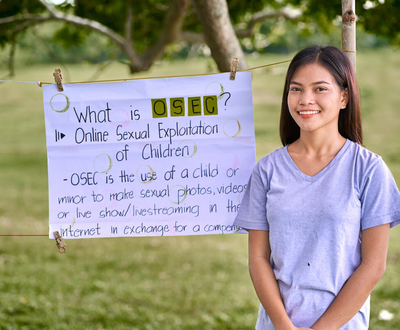
Michaela, 16, folds the white banner. It’s almost noon in the Philippines. She waves goodbye to her friends whom she just had a brief discussion about Online Sexual Exploitation of Children (OSEC).
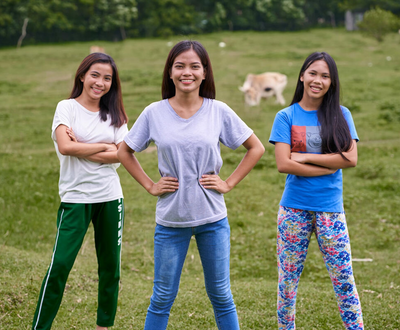
Michaela with friends
“When adults are encouraging children to do bad things online, the children’s perspective of themselves becomes distorted as well. The children grow in fear, unable to express their real feelings and thoughts. Children do not know that their pictures could reach several individuals in various countries. Exploited children have fear, but they’re unable to do something about their situation because they are merely children. They think that everything online is okay. This is not good. Sexual exploitation can start when young people are naïve."
“My sister is my inspiration and role model: we have both been sponsored, and she was a World Vision child leader. I observed what she used to do with World Vision and in school, and I decided to do the same. When I’m not studying, I share with other youth what I learned from World Vision youth activities that I attended before the pandemic. I’m enjoying teaching children at the moment. It makes me happy to see that they are learning from what I am sharing. Joining World Vision activities taught me a lot, such as never giving up on what you want to achieve in life, believe in yourself that you can do things, and be a good leader so other children and youth will follow your good examples. Today, we discussed online safety. Children nowadays are growing so addicted to the internet that they forget to talk to their friends and families. I guess children’s activities are one way to help children avoid deceitful individuals online, because children will be more aware on what to do. There are two reminders that I usually share with my friends: One, never, ever give your password. And, two, never share your personal information online. I know some young people who shared their Facebook passwords and information to their boyfriends or girlfriends, which is not a good thing because who knows what will happen?”
Michaela, youth leader in the Philippines
It hasn’t been an easy road for Michaela’s family since her father died at the beginning of 2021. Michaela is putting what she has learned from her parents, World Vision, and through her sponsor’s support into action – not just for her family, but for her community. One child, one reason at a time, you can help a young person like Michaela avoid life-altering exploitation and harm.
With the lives of children at risk in new and unforgiving ways, you can be the change in a child's life today.
Related Stories
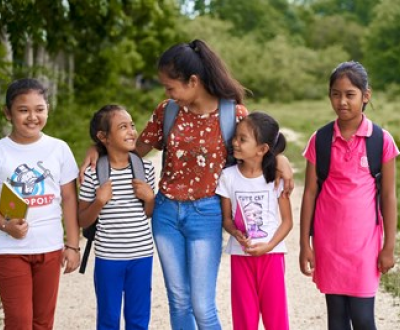
5 girls who broke the bonds
Child sponsorship empowers girls to make a long-lasting difference in their communities.
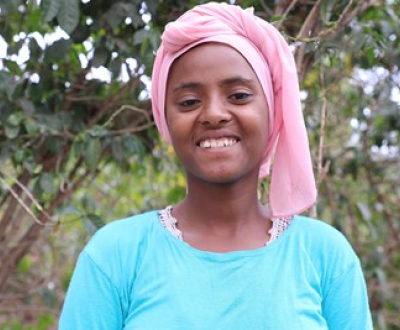
Taking up the fight in Ethiopia
Semira's vision to educate all girls about the harm of FGM, forced marriages and gender violence.

Fighting for her future in Bangladesh
Education equips girls with the right skills to combat arranged marriages and the poverty cycle.